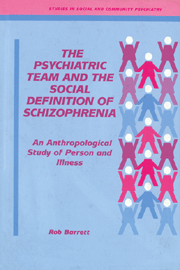 The Psychiatric Team and the Social Definition of Schizophrenia
The Psychiatric Team and the Social Definition of Schizophrenia Book contents
- Frontmatter
- Dedication
- Contents
- Foreword
- Preface
- Acknowledgements
- 1 Schizophrenia in Context
- 2 Time and Space in a Progressive Psychiatric Hospital
- 3 Professional Domains and the Dimensions of a Case
- 4 Clinical Teams and the ‘Whole Person’
- 5 Documenting a Case: The Written Construction of Schizophrenia
- 6 Moral Trajectories: From Acute Psychosis to ‘Chronic Schizophrenic’
- 7 Historical Formulations of Schizophrenia: Degeneration and Disintegration
- 8 Contemporary Formulations of Schizophrenia: Explaining the Inexplicable
- 9 Schizophrenia for Practical Purposes
- 10 The Person, the Case, and Schizophrenia
- References
- Index
10 - The Person, the Case, and Schizophrenia
Published online by Cambridge University Press: 05 August 2016
- Frontmatter
- Dedication
- Contents
- Foreword
- Preface
- Acknowledgements
- 1 Schizophrenia in Context
- 2 Time and Space in a Progressive Psychiatric Hospital
- 3 Professional Domains and the Dimensions of a Case
- 4 Clinical Teams and the ‘Whole Person’
- 5 Documenting a Case: The Written Construction of Schizophrenia
- 6 Moral Trajectories: From Acute Psychosis to ‘Chronic Schizophrenic’
- 7 Historical Formulations of Schizophrenia: Degeneration and Disintegration
- 8 Contemporary Formulations of Schizophrenia: Explaining the Inexplicable
- 9 Schizophrenia for Practical Purposes
- 10 The Person, the Case, and Schizophrenia
- References
- Index
Summary
This book is about the social definition of schizophrenia. It has examined how this illness is constituted and endowed with meaning within the institutional and cultural context of modern society. I have explored this relationship between illness and context by studying the Schizophrenia Team at Ridgehaven Hospital, where there was a concentration of people who experienced this disorder and where the daily work of clinical staff was to diagnose schizophrenia, think about it, talk about it, write about it, and treat it. I have used an ethnographic research strategy in order to ground schizophrenia, as a category of practical knowledge, in the collective intellectual work and the day-to-day interactions of these patients, psychiatrists, nurses, and social workers. I have also linked illness to social context by turning back to the earliest formulations of schizophrenia, dementia praecox, and their precursors to see how they were first conceived within the European asylums and universities of the nineteenth century. I am interested in the way these formulations reflected the intellectual climate of that era and, in particular, how they were predicated on theories of personhood that were current at that time.
As a synchronic analysis of Ridgehaven Hospital in the 1980s and as a diachronic analysis spanning two centuries of psychiatric thought, the purpose of this book has been to examine psychiatric institutions, their ideas and practices, and how they define what it is to be a person, what it is to be a case of psychiatric illness, and what it is to have schizophrenia.
From hospital organization to case
The problems I addressed in this book were initially formulated from within a theoretical framework of social phenomenology, as this movement in philosophy has been received and employed within anthropology and sociology over the past three decades. I began with the study of two phenomenal categories—time and space—asking how they might be invested with meaning within a psychiatric hospital. At Ridgehaven time was signified chiefly in terms of progress, a theme that not only linked the hospital to a wider progressivist society but also unified the hospital internally by pervading its many disparate domains: its logo, style of leadership, oral and written histories, future goals, concept of science, and, most importantly, the professional identity of the people who worked there.
- Type
- Chapter
- Information
- The Psychiatric Team and the Social Definition of SchizophreniaAn Anthropological Study of Person and Illness, pp. 272 - 307Publisher: Cambridge University PressPrint publication year: 1996
